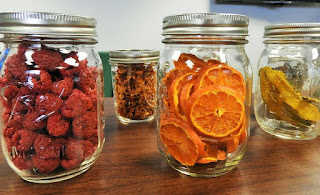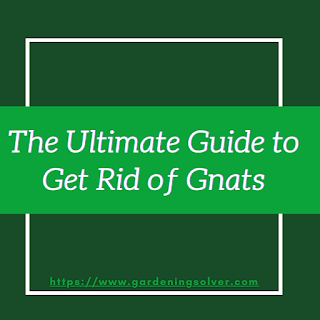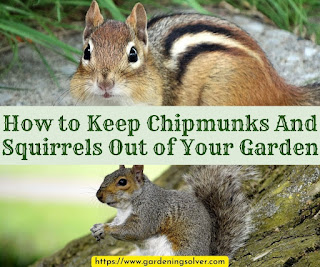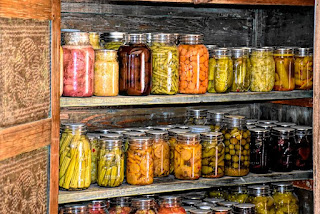How to Get Rid of Moles, Voles, and Gophers
 |
Are you noticing unusual holes, and fresh mounds of dirt in your lawn, garden, or farm? If so you may be dealing with moles, voles, or gophers. These animals remind me that not all lawn or garden problems are directly related to disease, insect, or weeds issues. Once they invade your garden, they can cause significant damage.
Therefore you need to take action before your beautiful lawn and plants become a memory of the past. Although these creatures sound similar, they are in fact very different. After going through this guide, you'll know what each animal looks like and how they cause damage. Above all, you'll learn how to get rid of moles, voles, and gophers without stressing yourself out.
Disclosure: This post contains affiliate links. We may receive commissions on purchases made from our chosen links with no extra cost to you. Learn more.
Moles - Description
i. Appearance
The most telling feature of moles is their pointed snout and large front feet which they use for digging. They have small eyes and ears that are not easily seen. Moles spend most of their lives underground in tunnels and due to their tiny eyes they can't withstand sunlight.
The color of their fur is brown to dark gray. Their fur is short and has no grain, which allows them to move easily both forward and backward through the soil.
ii. What Attracts Moles
Moles are attracted to areas that have lots of insects, cool temperatures, fertile and loam soils. Their primary food source consists of earthworms, grubs, and other small insects in the soil.
iii. Damage
As these nocturnal mammals dig their tunnels, they disturb the root system of plants. This causes plants to lose nutrients and die. Their damage also makes plant roots become susceptible to diseases.
Look for rounder, volcanic-shaped dirt mounds and small hills or ridges to identify mole damage. Not only do they damage plants or lawn, but they can also cause a lot of damage to the foundation of your home, especially if it's easy enough to dig.
How To Get Rid of Moles
Remove Their Food Source
Get rid of mole food sources with milky spore which is a natural pest control to eliminate the grubs. You can also introduce beneficial nematodes to your lawn to hunt and kill insects. Beneficial nematodes are non-toxic and completely safe for plants, people, and pets. But if you prefer to use insecticides, get a grub killer such as GrubEX.
Trap Them
Traps are most effective, but before using this method consult your local department of agriculture or wildlife in your area. In most areas it's legal to trap moles but the methods you are allowed to use vary depending on where you live. Types include plunger traps, tunnel traps, live-catch tunnel traps, and scissor traps.
Trick the Moles With Bait
Dig earthworms or buy them online to lure the moles. Or you can use Tomcat mole killer bait or Talpirid mole bait for most effective results. But make sure to keep those baits out of reach of children and pets, and use as directed.
Plants That Repel Moles
Instead of killing moles, simply deter them with planting vegetative barriers. These include plants such as marigolds, daffodils, castor bean, fritillarias, and alliums. You can purchase seeds online.
Voles - Description
i. Appearance
Voles look like mice and they're usually mistaken for rats and house mice. They have rounded ears and small eyes like mice, but their eyes are more visible than moles. Voles have either brown, gray, or black fur depending on the species. When compared to a gopher and mole, voles are the smallest.
ii. What Attracts Voles
These mouse-like creatures prefer to live in dense, creeping, or low-lying vegetation. They live in large groups just like most rodents. Furthermore, they usually live in existing holes made by other animals. Voles are primarily herbivores They feed on bark, shallow roots, bulbs, and seeds of grasses and ornamental plants.
iii. Damage
Since these mammals are herbivores, and live in large groups they create a lot of damage within a short time. Voles cause damage to shrubs, small trees, and woody ornaments. They chew-up bark near the base of trees and shrubs. If you see partially eaten potatoes, carrots, or any other root vegetables, you may be dealing with voles.
Voles create shallow surface tunnels that don't have dirt surrounding the entryway. They also create a pattern of runaway over the lawn and soil of your yard when they're revisiting their food source.
How To Get Rid of Voles
Protect Plants
Since these mammals love to chew the vulnerable stems of woody ornamental plants and young trees, wrap the lower trunk of your trees with a guard, like a plastic tubing or a wire mesh. You can even add a mesh barrier to gardens, trees, and fence lines to discourage voles.
Keep Your Yard Tidy
As we mentioned that voles like dense and heavy vegetative cover, you need to keep your yard neat. Overgrown brush and weeds provide hiding areas and are a great habitat for them. So, keep lawns mowed, shrubs pruned, remove fallen fruits, and other debris. By this way, you can be able to keep vole numbers down.
Set Trap
Trapping is an effective method to eliminate small populations of voles. When opting for this method, buy fold a shingle or covered traps instead of standard ones so that you won't end up catching birds or other non targeted animals.
Use Rodenticide
Using rodenticide is also an effective way to eliminate voles, especially if you're dealing with large vole populations. Rodenticide can be used in home landscapes and in commercial orchards. If you prefer to use rodenticide, make sure to find an anticoagulant one which is labelled for voles.
Destroy the Tunnels
Repair vole damage by destroying burrows and runaways with a rototiller or shovel. This will discourage new voles to come and live in those existing holes.
Gophers - Description
i. Appearance
Gophers are the most common burrowing pests across North America. They are known as pocket gophers which actually refers to their external fur lined pouches on cheeks. They use their pockets to carry food and nest material.
Gophers have large visible teeth and sharp claws which they use for burrowing underground. They also have short and thick tails that help them feel their way when moving backwards through their tunnels. The standard color of voles ranges from black to yellowish brown, and mostly closely resemble groundhogs or squirrels. Moreover, most of their species have the color of soil they reside in.
ii. What Attracts Gophers
Just like many pests, gophers are attracted to stable food sources. They shift seasonally according to the availability of food. These pests are herbivores so they prefer areas where vegetation is abundant (vines, trees, ornamental plants, garden crops with tubers, shrubs, etc). They also even feed on garden insects. Additionally, gophers are usually found in areas with sturdy soil that’s rich in moisture and clay.
iii. Damage
These little critters typically remain underground in their burrow system, and for this reason they're capable of causing damage underground that may be not visible for a long time. Gophers create large mounds of dirt that measures over one foot in diameter. Look for kidney bean shaped to identify a gopher mound.
Gophers often damage yards and gardens as they feed on vegetation (vines, trees, ornamental plants, garden crops, shrubs, etc). Also they're capable of pulling entire plants, from root to stem down into their tunnels. Not only that but these little critters can do a lot of damage to irrigation systems, landscaping, and underground wiring.
How To Get Rid of Gophers
Protect Plants
Use gopher baskets to plant vulnerable plants and vegetables. Gopher baskets come in different sizes and are usually made of galvanized or chicken wire or, which will last for a long time. You can even build a fence that extends underground so that gophers won't burrow under it.
Create a Noisy Environment
Gophers don't like disruptive areas, so you can create an unpleasant environment for them by using vibrating stakes. You simply dig the hole that fits the stake and the electronic pulses will disrupt the gophers. It's an easy method and you won't be able to feel or hear anything while it's inserted into the ground.
Use Smells That They Hate
Gophers don't like the smell of castor oil, coffee grounds, and fish fins. They also dislike plants such as marigolds, oleander, gopher spurge, and castor beans, so you can consider planting those types of plants.
Set a Trap
Trapping is a safe and most effective method for controlling gophers. There are different types and brands of gopher traps available online and in stores including Cinch and Macabee. Just get one and make sure to follow the manufacturer's instructions for successful trapping.
Add Gravel or Mulch
Add mulch around your plants as these creatures dislike the taste and smell of mulch. By this way they won't be able to pull your plants underground or eat their tops. You can even substitute mulch with gravel as it is also a similar barrier around yards.
Build Raised Beds
Raised beds are also one of the most effective barriers against gophers. You can buy a planter or opt for DIY and add a wall around your bed.
Takeaway
Now that you're armed with the knowledge on how to get rid of moles, voles, and gophers, don't wait any longer to deter them. You can use conjunction of humane methods, preventative measures, or pesticides. Just decide the options that are best for your situation.
If you have comments or questions about these pests, let us know below!
RELATED: How to Get Rid of Chipmunks





I have found slightly raised lengths of dirt everywhere on my property. Is this a sign of moles or voles?
ReplyDeleteHow do I determine where their tunnel opening is for gophers? I am just so disheartened by these damn pests. They're disrupting my whole plan of a backyard oasis I am creating.
I have dealt with voles before after they destroyed my huge dollar amt of orinental lilies hosta an two roses rodent getter was my friend but the voles i had looked different than you said mine had smaller front legs pointed nose bigger eyes and longer teeth than a mouse more vicious also guess different species but finally got rid to have a nice yard and a garden with out losing everything to rodo wild life and birds squirrls and rabbits you have to decide between having to feed your family amd having nice yard thT you slave over and cost you big bucks and the things that R out to destroy all you have i for one will protect mine as hard as i can regardless. Of the destroyers life I know that wont set well with alot of ppl but iam sorry in advance but it is my opinion and my family im disabled and every cent i lose can not be replaced an i have to have alot of help which also hard to come by
ReplyDeleteWe have a lot of sign from miles that started in the fall last year, we never treated for them and now we are in spring and there is no sign of them, is it possible they are gone or are they just waking up still? We have had warmer spring weather for at least a month now? Tulips are coming up pretty good already? But no spring signs of them?
ReplyDelete